WITH CHINESE CHARACTERISTICS
Jack Ma: tycoon who soared on China's tech dreams grounded by regulators
by Helen Roxburgh

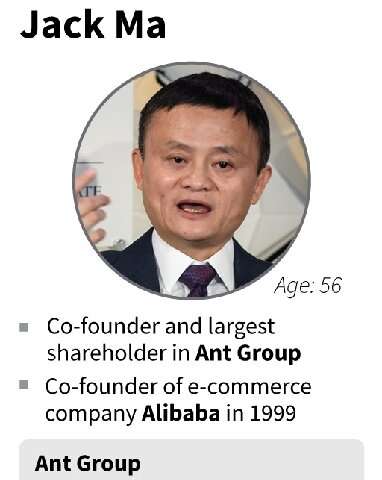
by Helen Roxburgh

Jack Ma's rags-to-riches backstory has come to embody a self-confident generation of Chinese entrepreneurs ready to shake up the world
Jack Ma, the ebullient and unconventional billionaire founder of tech giant Alibaba and the totem of China's entrepreneurial brilliance, now finds himself up against a Communist leadership seemingly intent on hacking back his empire and issuing a lesson that no one is bigger than the party.
Ma, the most recognisable face in Asian business with a fortune estimated at around $58 billion, has already faced the ignominy of having the world's biggest-ever IPO spiked by Chinese regulators days before its launch.
The November share sale was set to see his wealth bulge to more than $70 billion in a record-breaking listing of the group's Ant Group financial arm in Hong Kong and Shanghai.
But Chinese regulators abruptly pulled the deal, over what initially appeared to be concerns about the company's reach into the finances of hundreds of millions of Chinese people.
It was a brutal public rebuke to Ma, who was then called in for dressing down by regulators and has since evaporated from the spotlight he normally so ably commands.
Now China's poster boy for enterprise finds himself again caught in the glare of the Communist-run state, with Thursday's announcement of an anti-monopoly probe into Alibaba, the tech giant he founded, and the summoning of Ant Group by regulators.
It is another public relations catastrophe for Ma, a Communist Party member, whose rags-to-riches backstory has come to embody a self-confident generation of Chinese entrepreneurs ready to shake up the world.
Charismatic, diminutive and fast-talking, Ma was cash-strapped and working as an English teacher when someone showed him the internet on a 1990s trip to the United States—and he was hooked.
He toyed with several internet-related projects, before convincing a group of friends to give him $60,000 to start a new business in 1999 in China, then still emerging as an economic giant.
Alibaba was the result, an e-commerce empire founded from his bedroom in Hangzhou and which started an online shopping revolution and grew into a fintech titan.
The company changed the shopping habits of hundreds of millions of Chinese people, and catapulted Ma into the global limelight.
"The first time I used the internet, I touched on the keyboard and I find 'well, this is something I believe, it is something that is going to change the world and change China'," Ma once told CNN.
In 2014, Alibaba listed in New York in a world-record $25 billion offering.
Ant Group, in which Ma is the largest shareholder, is now the world-largest digital payments platform, claiming 731 million monthly users on the Alipay app.
But there are fears it reaches too deeply into the pockets of ordinary Chinese with its micro-loans, investment and insurance products.
Crossed the line?
Ma long enjoyed an image as the benevolent and unconventional billionaire.
Sometimes referred to in China as "Father Ma", he is praised for his self-deprecation—he recounts being rejected by Harvard "10 times"—and a knack for lighting up company events with song-and-dance appearances as Lady Gaga, Snow White and Michael Jackson.
As his fortune grew, Ma rebranded as a philanthropist—in 2019 retiring from the business to focus on giving.
But even his charitable work betrays an idiosyncratic touch.
After footage of a little boy in a village in central China who looked like Ma went viral, the businessman promised to pay for him to go through university.
But that reputation may be in the balance with the regulatory slap-down playing into a growing sense shared on China's Twitter-like Weibo that he has leaned into hubris by criticising fintech regulators.
He has faced his share of travails over the years in a country where getting rich risks catching the attention of the powerful.
Eyebrows were raised when the state-run People's Daily revealed that he is a member of the Communist Party—something Ma has never fully commented on.
He had previously indicated that he preferred to keep the state at arm's length, telling the World Economic Forum in 2007: "My philosophy is to be in love with the government, but never marry them."
But perhaps the biggest challenges remain ahead, as the size and scale of his business mean that relationship may need to be renegotiated.
Explore further Jack Ma: ebullient billionaire and totem of China's rise
China begins anti-monopoly probe into tech giant Alibaba
by Laurie Chen
Jack Ma, the ebullient and unconventional billionaire founder of tech giant Alibaba and the totem of China's entrepreneurial brilliance, now finds himself up against a Communist leadership seemingly intent on hacking back his empire and issuing a lesson that no one is bigger than the party.
Ma, the most recognisable face in Asian business with a fortune estimated at around $58 billion, has already faced the ignominy of having the world's biggest-ever IPO spiked by Chinese regulators days before its launch.
The November share sale was set to see his wealth bulge to more than $70 billion in a record-breaking listing of the group's Ant Group financial arm in Hong Kong and Shanghai.
But Chinese regulators abruptly pulled the deal, over what initially appeared to be concerns about the company's reach into the finances of hundreds of millions of Chinese people.
It was a brutal public rebuke to Ma, who was then called in for dressing down by regulators and has since evaporated from the spotlight he normally so ably commands.
Now China's poster boy for enterprise finds himself again caught in the glare of the Communist-run state, with Thursday's announcement of an anti-monopoly probe into Alibaba, the tech giant he founded, and the summoning of Ant Group by regulators.
It is another public relations catastrophe for Ma, a Communist Party member, whose rags-to-riches backstory has come to embody a self-confident generation of Chinese entrepreneurs ready to shake up the world.
Charismatic, diminutive and fast-talking, Ma was cash-strapped and working as an English teacher when someone showed him the internet on a 1990s trip to the United States—and he was hooked.
He toyed with several internet-related projects, before convincing a group of friends to give him $60,000 to start a new business in 1999 in China, then still emerging as an economic giant.
Alibaba was the result, an e-commerce empire founded from his bedroom in Hangzhou and which started an online shopping revolution and grew into a fintech titan.
The company changed the shopping habits of hundreds of millions of Chinese people, and catapulted Ma into the global limelight.
"The first time I used the internet, I touched on the keyboard and I find 'well, this is something I believe, it is something that is going to change the world and change China'," Ma once told CNN.
In 2014, Alibaba listed in New York in a world-record $25 billion offering.
Ant Group, in which Ma is the largest shareholder, is now the world-largest digital payments platform, claiming 731 million monthly users on the Alipay app.
But there are fears it reaches too deeply into the pockets of ordinary Chinese with its micro-loans, investment and insurance products.
Crossed the line?
Ma long enjoyed an image as the benevolent and unconventional billionaire.
Sometimes referred to in China as "Father Ma", he is praised for his self-deprecation—he recounts being rejected by Harvard "10 times"—and a knack for lighting up company events with song-and-dance appearances as Lady Gaga, Snow White and Michael Jackson.
As his fortune grew, Ma rebranded as a philanthropist—in 2019 retiring from the business to focus on giving.
But even his charitable work betrays an idiosyncratic touch.
After footage of a little boy in a village in central China who looked like Ma went viral, the businessman promised to pay for him to go through university.
But that reputation may be in the balance with the regulatory slap-down playing into a growing sense shared on China's Twitter-like Weibo that he has leaned into hubris by criticising fintech regulators.
He has faced his share of travails over the years in a country where getting rich risks catching the attention of the powerful.
Eyebrows were raised when the state-run People's Daily revealed that he is a member of the Communist Party—something Ma has never fully commented on.
He had previously indicated that he preferred to keep the state at arm's length, telling the World Economic Forum in 2007: "My philosophy is to be in love with the government, but never marry them."
But perhaps the biggest challenges remain ahead, as the size and scale of his business mean that relationship may need to be renegotiated.
Explore further Jack Ma: ebullient billionaire and totem of China's rise
China begins anti-monopoly probe into tech giant Alibaba
by Laurie Chen
DECEMBER 24, 2020
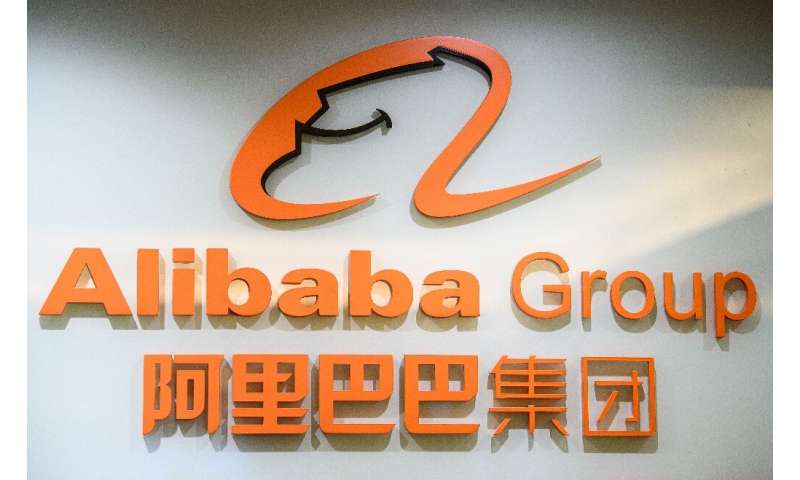

China has launched an anti-monopoly investigation into e-commerce giant Alibaba
China has launched an anti-monopoly investigation into Alibaba, regulators said Thursday, sending the share price of the e-commerce giant tumbling and intensifying the troubles of its billionaire founder Jack Ma.
Regulators will also hold "supervisory and guidance" talks with Alibaba's gigantic financial services subsidiary Ant Group, state media reported, just weeks after its record-breaking IPO was halted at the last minute by Beijing.
The continued squeeze on one of China's most influential companies is the latest sign that the Communist leadership is ready to deflate the ambitions of big tech firms in a runaway internet sector, which has made Ma one of China's richest people with an estimated $58 billion fortune.
Investigators are probing Alibaba for "suspected monopolistic practices", the State Administration for Market Regulation said in a statement.
The probe threatens to impede the growth of Alibaba, a tech juggernaut which revolutionised the e-commerce landscape of China.
Alibaba shares tumbled 8.6 percent to a five-month low in Hong Kong on the news.
In a statement, the company said it "will actively cooperate with the regulators on the investigation".
Financial services subsidiary Ant Group said it too would cooperate and "diligently study and strictly comply with regulatory departments' requests".
China has launched an anti-monopoly investigation into Alibaba, regulators said Thursday, sending the share price of the e-commerce giant tumbling and intensifying the troubles of its billionaire founder Jack Ma.
Regulators will also hold "supervisory and guidance" talks with Alibaba's gigantic financial services subsidiary Ant Group, state media reported, just weeks after its record-breaking IPO was halted at the last minute by Beijing.
The continued squeeze on one of China's most influential companies is the latest sign that the Communist leadership is ready to deflate the ambitions of big tech firms in a runaway internet sector, which has made Ma one of China's richest people with an estimated $58 billion fortune.
Investigators are probing Alibaba for "suspected monopolistic practices", the State Administration for Market Regulation said in a statement.
The probe threatens to impede the growth of Alibaba, a tech juggernaut which revolutionised the e-commerce landscape of China.
Alibaba shares tumbled 8.6 percent to a five-month low in Hong Kong on the news.
In a statement, the company said it "will actively cooperate with the regulators on the investigation".
Financial services subsidiary Ant Group said it too would cooperate and "diligently study and strictly comply with regulatory departments' requests".

Profile of Jack Ma, co-founder of Chinese e-commerce giants Alibaba and Ant Group.
Ant Group made its name via its main product Alipay, the online payments platform and super-app that is now deeply embedded in China's economy.
But the company has also expanded into offering loans, credit, investments and insurance to hundreds of millions of consumers and small businesses, spurring fear and jealously in a wider banking system geared more for supporting state policy and large corporations.
Its reach into the daily spend of Chinese has also caused anxiety over the potential for personal debt to turn sour and toxify the wider economy.
As global demand for the dual Hong Kong-Shanghai listing pushed the IPO toward record valuations—potentially handing Ma and Ant Group even more funding, legitimacy and clout—Chinese regulators acted.
The outspoken and charismatic Ma—a former teacher—had previously lashed out at China's outdated financial system, calling state-owned banks "pawn shops" in an October speech that led to him being summoned for regulatory talks shortly before Ant's IPO was suspended.
He has edged away from the public limelight since the IPO collapsed.
No one bigger than the Party
Noises from the top of the Chinese Communist Party are ominous for companies perceived to have outsized ambitions.
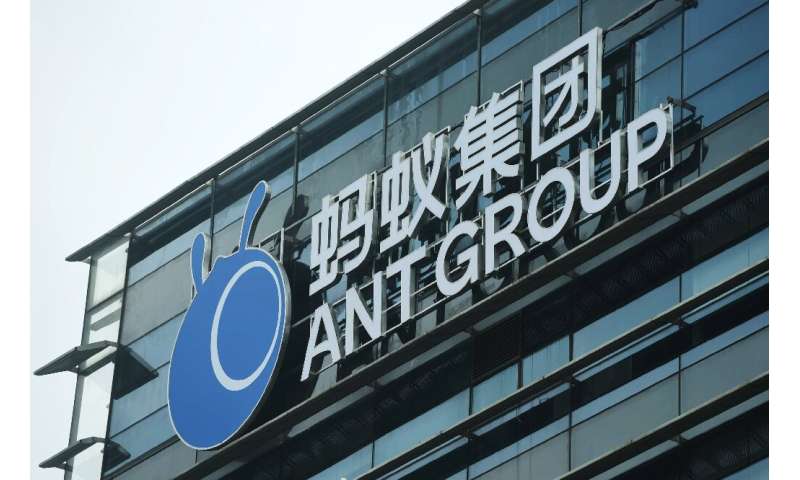
Ant Group made its name via its main product Alipay, the online payments platform and super-app that is now deeply embedded in China's economy.
But the company has also expanded into offering loans, credit, investments and insurance to hundreds of millions of consumers and small businesses, spurring fear and jealously in a wider banking system geared more for supporting state policy and large corporations.
Its reach into the daily spend of Chinese has also caused anxiety over the potential for personal debt to turn sour and toxify the wider economy.
As global demand for the dual Hong Kong-Shanghai listing pushed the IPO toward record valuations—potentially handing Ma and Ant Group even more funding, legitimacy and clout—Chinese regulators acted.
The outspoken and charismatic Ma—a former teacher—had previously lashed out at China's outdated financial system, calling state-owned banks "pawn shops" in an October speech that led to him being summoned for regulatory talks shortly before Ant's IPO was suspended.
He has edged away from the public limelight since the IPO collapsed.
No one bigger than the Party
Noises from the top of the Chinese Communist Party are ominous for companies perceived to have outsized ambitions.

Ant Group's massive IPO was halted at the last minute by Chinese authorities
Party leaders at last week's Central Economic Work Conference vowed to strengthen anti-trust measures and "firmly oppose monopolies" while the Party's executive Politburo body has also vowed to crack down on "disorderly capital expansion".
"There is an underlying political message, that no company, and no individual, can grow so big in China to the point where they can potentially challenge the authority of the CCP," Richard McGregor, senior fellow for East Asia at the Lowy Institute in Sydney, told AFP.
This year, Beijing has also implemented new regulations to contain potential risks in China's growing online lending industry, as the fintech arms of internet firms including Alibaba and Tencent have expanded and consolidated power over the market.
"Undoubtedly, Ant will now become a very different company in structure and in balance sheet," said Ryan Manuel, Chief Asia Strategist at Silverhorn Investment.
"Its regulatory environment will appear more like that of a financial services provider and less of a tech company. Its growth will slow. Its market valuation will decrease."
China's market regulator in November issued draft antitrust guidelines for internet platform economies that highlighted examples of anti-competitive behaviour.
State media have repeatedly called for tighter oversight of these firms, warning of potential financial instability as a result of their unregulated rapid growth.
Bad debt in China's chaotic financial system is a perennial risk, and regulators launched a crackdown on a growing nationwide credit addiction three years ago owing to fears of a financial meltdown.
Ant Group fiasco reflects battle for China's financial soul
by Dan Martin With Beiyi Seow In Beijing
NOVEMBER 5, 2020
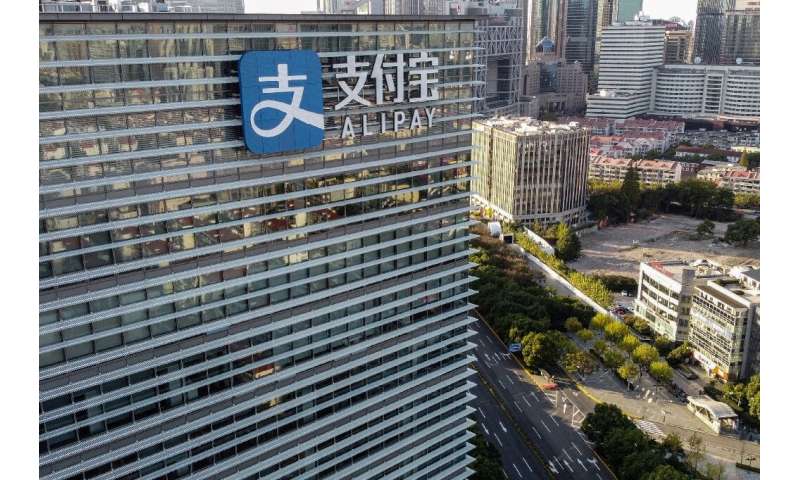
Alibaba fintech arm gets nod for record IPO listing in Hong Kong
OCTOBER 19, 2020
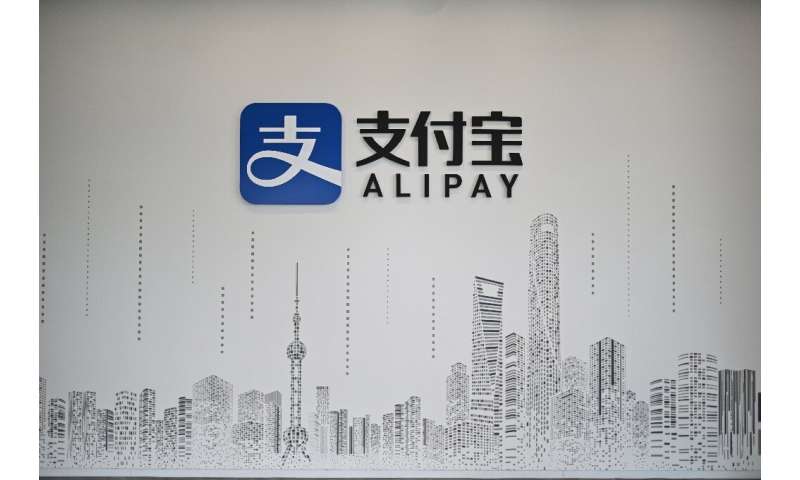
Party leaders at last week's Central Economic Work Conference vowed to strengthen anti-trust measures and "firmly oppose monopolies" while the Party's executive Politburo body has also vowed to crack down on "disorderly capital expansion".
"There is an underlying political message, that no company, and no individual, can grow so big in China to the point where they can potentially challenge the authority of the CCP," Richard McGregor, senior fellow for East Asia at the Lowy Institute in Sydney, told AFP.
This year, Beijing has also implemented new regulations to contain potential risks in China's growing online lending industry, as the fintech arms of internet firms including Alibaba and Tencent have expanded and consolidated power over the market.
"Undoubtedly, Ant will now become a very different company in structure and in balance sheet," said Ryan Manuel, Chief Asia Strategist at Silverhorn Investment.
"Its regulatory environment will appear more like that of a financial services provider and less of a tech company. Its growth will slow. Its market valuation will decrease."
China's market regulator in November issued draft antitrust guidelines for internet platform economies that highlighted examples of anti-competitive behaviour.
State media have repeatedly called for tighter oversight of these firms, warning of potential financial instability as a result of their unregulated rapid growth.
Bad debt in China's chaotic financial system is a perennial risk, and regulators launched a crackdown on a growing nationwide credit addiction three years ago owing to fears of a financial meltdown.
Ant Group fiasco reflects battle for China's financial soul
by Dan Martin With Beiyi Seow In Beijing
NOVEMBER 5, 2020

Ant Group's Alipay platform has helped revolutionise commerce and personal finance in China
China's last-minute abandonment of Ant Group's record-breaking IPO stems from an intensifying battle for the soul of the nation's financial system that the fintech giant and its charismatic leader Jack Ma helped to ignite.
Global markets were stunned Tuesday when Ant's record-breaking $34 billion IPO was abruptly shelved, frustrating investors eager for a piece of the fast-growing company.
The debacle has prompted head-scratching over how the IPO got so close –- shares were to begin trading Thursday -– only to collapse at the finish line.
Analysts say it was the culmination of an escalating rivalry between Ma, Ant's co-founder and the billionaire founder of Alibaba, and a state-dominated Chinese banking and regulatory system controlled by the Communist Party that has become uncomfortable with Ant's growing power.
Ant Group made its name via its main product Alipay, the online payments platform and super-app that is now deeply embedded in China's economy.
But the company has also expanded into offering loans, credit, investments and insurance to hundreds of millions of consumers and small businesses, spurring fear and jealously in a wider banking system geared more for supporting state policy and large corporations.
As global demand for the dual Hong Kong-Shanghai listing pushed the IPO toward record valuations—potentially handing Ma and Ant Group even more funding, legitimacy and clout—Chinese regulators acted.
In recent weeks, new minimum capital requirements and other restrictions on online lending were imposed to guard against "systemic risk", plugging some of the regulatory gaps that Ant Group had stepped through, analysts said.
"Given the magnitude of Ant Group's operations, the regulators might have felt that they did not have an appropriate handle on the flow of money being processed through Ant Group products," said Philippe Espinasse, a capital markets consultant and former investment banker.
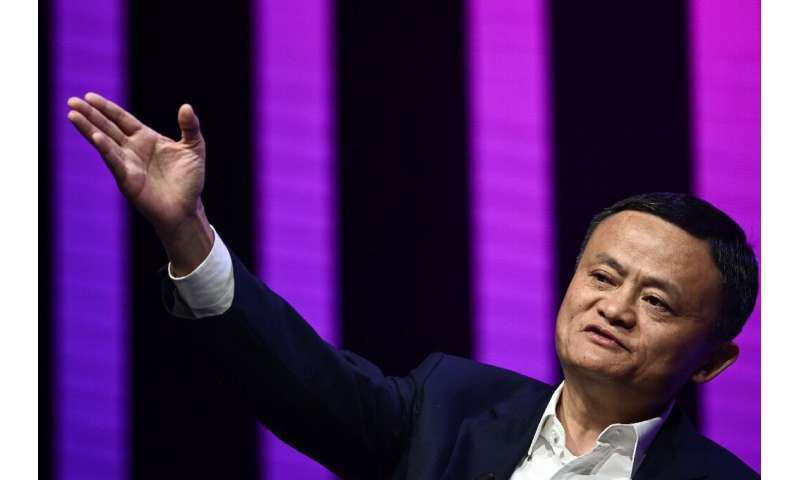
China's last-minute abandonment of Ant Group's record-breaking IPO stems from an intensifying battle for the soul of the nation's financial system that the fintech giant and its charismatic leader Jack Ma helped to ignite.
Global markets were stunned Tuesday when Ant's record-breaking $34 billion IPO was abruptly shelved, frustrating investors eager for a piece of the fast-growing company.
The debacle has prompted head-scratching over how the IPO got so close –- shares were to begin trading Thursday -– only to collapse at the finish line.
Analysts say it was the culmination of an escalating rivalry between Ma, Ant's co-founder and the billionaire founder of Alibaba, and a state-dominated Chinese banking and regulatory system controlled by the Communist Party that has become uncomfortable with Ant's growing power.
Ant Group made its name via its main product Alipay, the online payments platform and super-app that is now deeply embedded in China's economy.
But the company has also expanded into offering loans, credit, investments and insurance to hundreds of millions of consumers and small businesses, spurring fear and jealously in a wider banking system geared more for supporting state policy and large corporations.
As global demand for the dual Hong Kong-Shanghai listing pushed the IPO toward record valuations—potentially handing Ma and Ant Group even more funding, legitimacy and clout—Chinese regulators acted.
In recent weeks, new minimum capital requirements and other restrictions on online lending were imposed to guard against "systemic risk", plugging some of the regulatory gaps that Ant Group had stepped through, analysts said.
"Given the magnitude of Ant Group's operations, the regulators might have felt that they did not have an appropriate handle on the flow of money being processed through Ant Group products," said Philippe Espinasse, a capital markets consultant and former investment banker.

Jack Ma, co-founder of ecommerce titan Alibaba, had stood to become Asia's richest man via Ant Group's IPO
Ma sounds off
The moves angered Ma, 56, who had stood to become Asia's richest man via the IPO.
He uncharacteristically lashed out in a speech two weeks ago, saying capital requirements were outdated and that China lacked a true "financial ecosystem".
Ma likened Chinese banks to "pawn shops" for requiring loan collateral and implied that they underserved smaller, younger borrowers.
Chinese public figures rarely call out the government, and the reaction was swift.
A series of commentaries in government media mouthpieces pushed back against Ma, warning of extensive risks from online lenders like Ant Group and vowing tighter supervision.
Things came to a head Monday when Ma and two other Ant executives were summoned to a highly unusual meeting with financial regulators.
Exact details of the talks remain unknown, but the next day the Shanghai exchange pulled the IPO.
Ma's critiques "didn't sit well with regulators, many of whom have been grappling with the risks of micro-lending", said Alex Capri, a research fellow at Hinrich Foundation.
"Ant has grown too large and too influential as a financial institution in China, something that will not be tolerated by the (ruling Communist Party)," Capri said.
Ma sounds off
The moves angered Ma, 56, who had stood to become Asia's richest man via the IPO.
He uncharacteristically lashed out in a speech two weeks ago, saying capital requirements were outdated and that China lacked a true "financial ecosystem".
Ma likened Chinese banks to "pawn shops" for requiring loan collateral and implied that they underserved smaller, younger borrowers.
Chinese public figures rarely call out the government, and the reaction was swift.
A series of commentaries in government media mouthpieces pushed back against Ma, warning of extensive risks from online lenders like Ant Group and vowing tighter supervision.
Things came to a head Monday when Ma and two other Ant executives were summoned to a highly unusual meeting with financial regulators.
Exact details of the talks remain unknown, but the next day the Shanghai exchange pulled the IPO.
Ma's critiques "didn't sit well with regulators, many of whom have been grappling with the risks of micro-lending", said Alex Capri, a research fellow at Hinrich Foundation.
"Ant has grown too large and too influential as a financial institution in China, something that will not be tolerated by the (ruling Communist Party)," Capri said.
Experts say a robust online lending sector is needed to meet the needs of ordinary consumers but that China has reason to fear a borrowing binge.
Bad debt in the country's chaotic financial system is a perennial risk, and regulators launched a crackdown on a growing nationwide credit addiction three years ago owing to fears of a financial meltdown.
'Awful' timing
But Ant now boasts around 500 million users of its loan and credit products, which allow consumers to take out cash loans or access revolving credit lines.
This has stoked fears of a younger digital generation with little risk awareness falling into a life-long debt spiral, said Zhang Gang, a strategist with Central China Securities.
"Because of Ant's scale and influence, they may dominate private lending in the future and ... (acquire) private lending companies," said Zhang, who feels tighter regulations are badly needed.
The IPO is expected to eventually go ahead after Ant complies with the new regulatory requirements, which it has vowed to do, although analysts expect the size and valuation to be lower in light of the curbs on Ant's businesses.
But the "awful" timing of the IPO's withdrawal could dent China's hopes of being viewed as a financial and technology force to rival the United States, said Espinasse.
Beijing is pushing its national tech champions to list on China's stock exchanges rather than in the US, partly because of an escalating bilateral rivalry.
"This potentially has significant implications, not just for homecoming listings but also for listings of Chinese tech companies more generally," Espinasse said.
"Ultimately, financial markets are all about trust and transparency and it looks like we don't have that right now."
China's Ant Group postpones IPO under regulatory pressure
by Dan Martin, With Jing Xuan Teng In Beijing
Bad debt in the country's chaotic financial system is a perennial risk, and regulators launched a crackdown on a growing nationwide credit addiction three years ago owing to fears of a financial meltdown.
'Awful' timing
But Ant now boasts around 500 million users of its loan and credit products, which allow consumers to take out cash loans or access revolving credit lines.
This has stoked fears of a younger digital generation with little risk awareness falling into a life-long debt spiral, said Zhang Gang, a strategist with Central China Securities.
"Because of Ant's scale and influence, they may dominate private lending in the future and ... (acquire) private lending companies," said Zhang, who feels tighter regulations are badly needed.
The IPO is expected to eventually go ahead after Ant complies with the new regulatory requirements, which it has vowed to do, although analysts expect the size and valuation to be lower in light of the curbs on Ant's businesses.
But the "awful" timing of the IPO's withdrawal could dent China's hopes of being viewed as a financial and technology force to rival the United States, said Espinasse.
Beijing is pushing its national tech champions to list on China's stock exchanges rather than in the US, partly because of an escalating bilateral rivalry.
"This potentially has significant implications, not just for homecoming listings but also for listings of Chinese tech companies more generally," Espinasse said.
"Ultimately, financial markets are all about trust and transparency and it looks like we don't have that right now."
China's Ant Group postpones IPO under regulatory pressure
by Dan Martin, With Jing Xuan Teng In Beijing
NOVEMBER 3, 2020
Ant Group chief chairman Jack Ma was summoned with other executives to meet central bank and regulatory officials
China's Ant Group on Tuesday suspended its record-breaking IPO in both Hong Kong and Shanghai as the fintech giant faces growing pressure from Chinese regulators over potential risks.
The firm's Alipay platform has helped revolutionise commerce and personal finance in China, with consumers using the smartphone app to pay for everything from meals to groceries and travel tickets.
But Ant Group, which has more than 700 million monthly active users, has also caused concern in China's state-controlled finance sector by venturing into personal and consumer lending, wealth management and insurance.
Ant will suspend both legs of its $34 billion listing—originally set to take place this week—after being ordered by Chinese regulators to postpone its Shanghai offering over concerns it would not meet listing requirements, the company said in a filing Tuesday.
The Shanghai stock exchange issued the surprise order due to "major issues such as changes in the fintech supervisory environment", the bourse said in a separate statement on the same day.
The shock announcement sent the New York-listed shares of affiliated e-commerce titan Alibaba plunging by as much as nine percent as US markets opened Tuesday.
The suspension comes after co-founder Jack Ma, Ant Group chairman Eric Jing, and chief executive Simon Hu were summoned to an unusual meeting with regulators on Monday, while state media have recently issued warnings about potential financial instability that could result from Ant Group's rapid growth.
It also follows new state regulations to contain potential risks in China's growing online lending industry, a sector Ant Group has aggressively moved into.
Fintech risks
China's regulators are "attempting to maintain control over a fintech sector that is already huge, profitable, and rapidly evolving," Brock Silvers, chief investment officer at Kaiyuan Capital, told AFP.
Ma, one of China's richest and most powerful business figures as well as Ant Group's controlling shareholder, has faced state media criticism for comments in late October in which he boasted of the size of the IPO and appeared to criticise regulators for stifling fintech innovation.
A Sunday commentary in the state-controlled Financial News warned of internet giants like Ant Group getting too big, saying any resulting systemic problems "will lead to serious risk contagion".
The state-owned Economic Daily newspaper responded Tuesday to the suspension calling it a demonstration of regulators' determination to "safeguard the interests of investors".
"Those who try to subvert the existing system will certainly offend the vested interests just like taxi drivers do not like Uber," said Ivan Li, investment research director of CSL Securities in Hong Kong.
Ant said in a separate social media post Tuesday that it "sincerely apologizes... for any inconvenience caused by this development", adding that it would cooperate with regulators.
The share sale was set to beat the $29 billion chalked up by previous record-holder Saudi Aramco last December.
The Hong Kong Stock Exchange said Tuesday it had been notified by Ant of the suspension but would not comment on specific listings.
Beijing has called on national flagships of the tech sector to list on domestic stock exchanges rather than fundraise in the US, in a period of sharp economic and political rivalry.
China's Ant Group on Tuesday suspended its record-breaking IPO in both Hong Kong and Shanghai as the fintech giant faces growing pressure from Chinese regulators over potential risks.
The firm's Alipay platform has helped revolutionise commerce and personal finance in China, with consumers using the smartphone app to pay for everything from meals to groceries and travel tickets.
But Ant Group, which has more than 700 million monthly active users, has also caused concern in China's state-controlled finance sector by venturing into personal and consumer lending, wealth management and insurance.
Ant will suspend both legs of its $34 billion listing—originally set to take place this week—after being ordered by Chinese regulators to postpone its Shanghai offering over concerns it would not meet listing requirements, the company said in a filing Tuesday.
The Shanghai stock exchange issued the surprise order due to "major issues such as changes in the fintech supervisory environment", the bourse said in a separate statement on the same day.
The shock announcement sent the New York-listed shares of affiliated e-commerce titan Alibaba plunging by as much as nine percent as US markets opened Tuesday.
The suspension comes after co-founder Jack Ma, Ant Group chairman Eric Jing, and chief executive Simon Hu were summoned to an unusual meeting with regulators on Monday, while state media have recently issued warnings about potential financial instability that could result from Ant Group's rapid growth.
It also follows new state regulations to contain potential risks in China's growing online lending industry, a sector Ant Group has aggressively moved into.
Fintech risks
China's regulators are "attempting to maintain control over a fintech sector that is already huge, profitable, and rapidly evolving," Brock Silvers, chief investment officer at Kaiyuan Capital, told AFP.
Ma, one of China's richest and most powerful business figures as well as Ant Group's controlling shareholder, has faced state media criticism for comments in late October in which he boasted of the size of the IPO and appeared to criticise regulators for stifling fintech innovation.
A Sunday commentary in the state-controlled Financial News warned of internet giants like Ant Group getting too big, saying any resulting systemic problems "will lead to serious risk contagion".
The state-owned Economic Daily newspaper responded Tuesday to the suspension calling it a demonstration of regulators' determination to "safeguard the interests of investors".
"Those who try to subvert the existing system will certainly offend the vested interests just like taxi drivers do not like Uber," said Ivan Li, investment research director of CSL Securities in Hong Kong.
Ant said in a separate social media post Tuesday that it "sincerely apologizes... for any inconvenience caused by this development", adding that it would cooperate with regulators.
The share sale was set to beat the $29 billion chalked up by previous record-holder Saudi Aramco last December.
The Hong Kong Stock Exchange said Tuesday it had been notified by Ant of the suspension but would not comment on specific listings.
Beijing has called on national flagships of the tech sector to list on domestic stock exchanges rather than fundraise in the US, in a period of sharp economic and political rivalry.
Alibaba fintech arm gets nod for record IPO listing in Hong Kong
OCTOBER 19, 2020

Ant Group runs Alipay, one of China's two dominant online payment systems
The financial arm of Chinese e-commerce titan Alibaba received Monday a green light from Chinese regulators to list in Hong Kong, according to data published online, another step towards the biggest IPO in history.
Ant Group aims to raise a massive $35 billion via the share sale in a joint listing in the semi-autonomous finance hub and Shanghai, Bloomberg News has previously reported, citing unnamed sources.
The company is looking to raise the cash—far more than the $29 billion chalked up by Saudi Aramco in December—in a split float between the two Chinese cities, Bloomberg said.
The plan values Ant Group at about $250 billion, it added.
The company runs Alipay, the dominant online payment system in China, where cash, cheques and credit cards have long been eclipsed by e-payment devices and apps.
According to a report in Hong Kong's South China Morning Post, Ant Group has also been granted approval by the city's stock exchange.
In September, the Shanghai Stock Exchange's Star Market platform gave its go ahead for a listing, which meant the Hangzhou-based firm only needs a final, formal approval from the China Securities Regulatory Commission (CSRC).
In its August filing, Ant said it would use the proceeds to expand cross-border payments and enhance its research-and-development capabilities.
The decision not to list in New York is a big loss for US markets and comes as Washington ramps up scrutiny of Chinese tech firms.
A number of high-profile Chinese firms—especially those in the tech sector—have turned to Hong Kong owing to tension between Washington and Beijing.
It is also a shot in the arm for Hong Kong as fears mount over the potential fallout of Beijing's imposition of a new national security law on the city.
Explore further
The financial arm of Chinese e-commerce titan Alibaba received Monday a green light from Chinese regulators to list in Hong Kong, according to data published online, another step towards the biggest IPO in history.
Ant Group aims to raise a massive $35 billion via the share sale in a joint listing in the semi-autonomous finance hub and Shanghai, Bloomberg News has previously reported, citing unnamed sources.
The company is looking to raise the cash—far more than the $29 billion chalked up by Saudi Aramco in December—in a split float between the two Chinese cities, Bloomberg said.
The plan values Ant Group at about $250 billion, it added.
The company runs Alipay, the dominant online payment system in China, where cash, cheques and credit cards have long been eclipsed by e-payment devices and apps.
According to a report in Hong Kong's South China Morning Post, Ant Group has also been granted approval by the city's stock exchange.
In September, the Shanghai Stock Exchange's Star Market platform gave its go ahead for a listing, which meant the Hangzhou-based firm only needs a final, formal approval from the China Securities Regulatory Commission (CSRC).
In its August filing, Ant said it would use the proceeds to expand cross-border payments and enhance its research-and-development capabilities.
The decision not to list in New York is a big loss for US markets and comes as Washington ramps up scrutiny of Chinese tech firms.
A number of high-profile Chinese firms—especially those in the tech sector—have turned to Hong Kong owing to tension between Washington and Beijing.
It is also a shot in the arm for Hong Kong as fears mount over the potential fallout of Beijing's imposition of a new national security law on the city.
Explore further
No comments:
Post a Comment